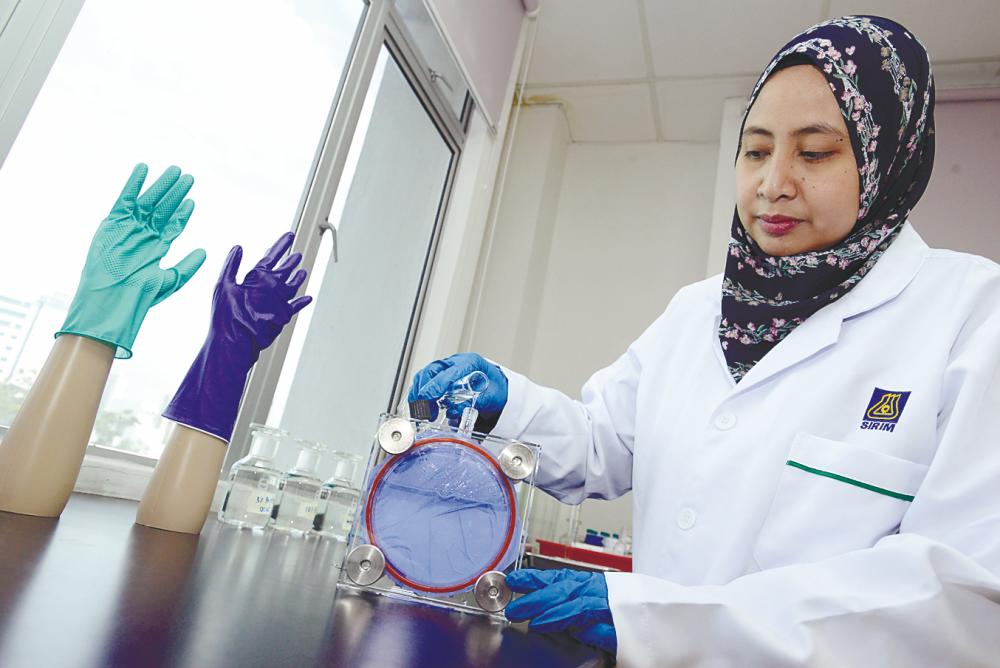PETALING JAYA: Sirim Bhd’s Industrial Biotechnology Research Centre (IBRC) has introduced new testing services to support the pharmaceuticals and medical device industries in line with new requirements by regulatory authorities in the last two years.
The new services are extractables and leachables (E&L) for pharmaceuticals and medical devices; test for nitrosamines for pharmaceutical, medical devices and food; as well as permeation, degradation and migration tests in gloves for medical use and food handling.
E&L testing enables manufacturers to identify, quantify and identify the risk of leachable impurities migrating into a drug solution from container closure systems, processing equipment, packaging or medical devices.

IBRC general manager Dr Ahmad Hazri Ab Rashid said the new regulations and guidelines stemmed from the advancement in scientific knowledge on the effects of various compounds to human health and the lowest limits of analytical quantification of these compounds.
“Companies are now looking at labs that can perform these tests. As far as we know, we’re the only lab (in Malaysia) that is able to do the E&L test. For nitrosamines, the number of labs is limited as the equipment required to do the test is expensive. We’re one of the labs that is able to perform this test, while few labs offer permeation, degradation and migration tests in gloves,“ he said in a virtual interview last week.
He added that Sirim’s IBRC provides state-of-the-art facility for testing and offers an alternative for industries to get their products tested locally, rather than performing such tests overseas, thus saving costs and time.
“We’re offering these services to the industries so that they can meet the regulatory requirements, whether locally or globally. It’s a big advantage for the industries that they have a local lab (Sirim) that can assist them in their submissions to the regulatory authorities in Malaysia and around the world,“ said Hazri.
Besides serving top local pharmaceutical and glove companies, IBRC also serves international clients from Singapore, Thailand and New Zealand.
Permeation testing is designed to measure the breakthrough time for determination of the resistance of protective clothing, gloves and footwear materials to permeation by potential hazardous liquid chemicals under the condition of continuous contact. By doing such testing, glove manufacturers can classify their glove performance level.
Degradation testing is designed for the determination of the resistance of protective glove materials to degradation by dangerous chemicals with continuous contact. This testing is mandatory for all gloves that offer chemical protection.
The classification of gloves according to its permeation characteristics will enable users to choose the right type of gloves for their specific applications to ensure the safety of the users.
Hazri said the rigorous testing procedures are important to these industries as a quality assurance that products from manufacturers meet the quality requirements of each product in the form of technical specifications.
“The benefit derived by the public on the performance of all these rigorous testing on these health products is the assurance that the product complies at least to the minimum quality standards and is safe for consumption and application.”
Sirim is establishing a Medical Device Innovation Centre (MDIC) with a mission of developing the nation’s medical device industry as a whole to enhance its competitiveness, MDIC aims to assist in building capabilities to address manufacturing gaps and market regulations as well as growing the product innovation capabilities of medical device manufacturers in the country.
Sirim offers a wide range of services that include biomodelling and prototyping, industrial research and product innovation, technology commercialisation, accredited testing, certifications, training and consultation. Supported by its industrial research centres and subsidiaries, Sirim has an extensive range of capabilities, from research and development to commercialisation, that industry players can tap into to facilitate market access.
To ensure the success of MDIC, all parties involved, such as the government, industry and research institutes, have to work closely together. Essentially, the establishment of a solid platform will allow all industry players to move forward together for the benefit of both industry and the nation and ensure that nobody is left behind.














